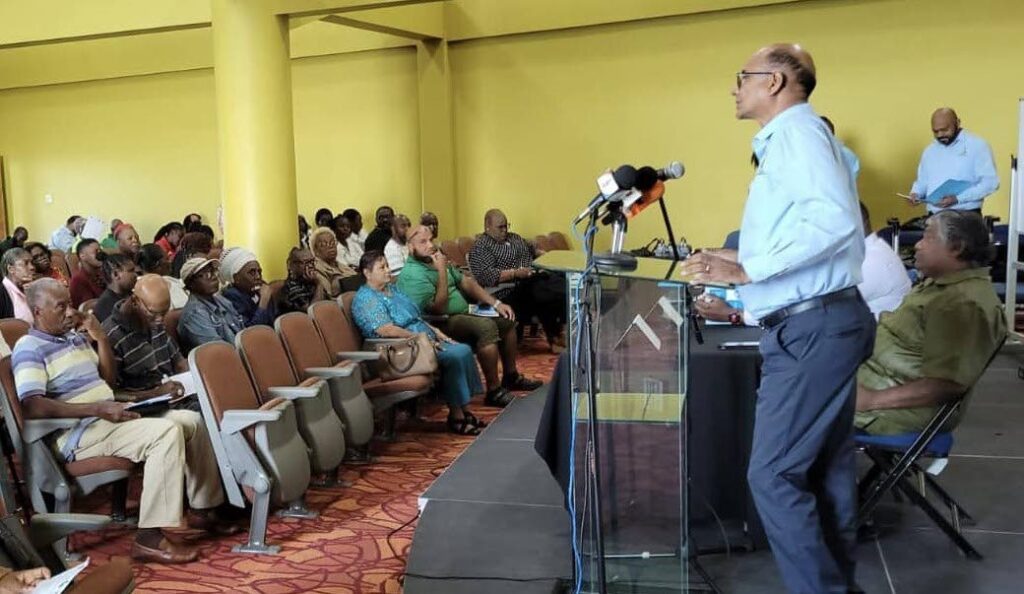Tobago farmers urged to innovate, adopt sustainable practices

AS a small island developing state, Tobago remains vulnerable to rising global temperatures and extreme weather patterns.
Local farmers recently attended a one-day workshop at Shaw Park Complex, to learn about methods to make their yields resilient. The workshop was hosted by the MarVista Institute for Agriculture Training and Development (MIATD), Argyle United Farmers Development Group (AUFDG) and Republic Bank Ltd in collaboration with the Tobago House of Assembly.
THA Secretary of Food Security, Natural Resources, the Environment and Sustainable Development Nathisha Charles-Pantin said the island continues to experience the unpredictable impact of climate change. She said the discussion would go beyond the effects of climate change on a global and regional scale and delve into the heart of the matter, and the profound impact it has on the agricultural practices in Tobago.
She noted that in recent years, the world has recognised climate change not only as an environmental challenge, but as a multi-faceted issue that intricately affects lives.
“Now more than ever, it is imperative that we pay heed to the global discourse on climate change for its tendrils reach far and wide, impacting our most vital source of sustenance – our food.
"The intricate balance of ecosystems that support agriculture is being disrupted, posing a threat to crop yields, livestock and the very foundation of our food systems," Charles-Pantin said.
She said as extreme weather systems are being witnessed, shifting seasons and unpredictable patterns, the urgency to address climate change becomes ever clearer.
“Climate change recognised as an indisputable global phenomenon has evolved into an inescapable reality with consequences that ripple far beyond any specific geographical boundaries. The delicate balance of ecosystems, crucial for sustaining agriculture, is undergoing profound disruptions, presenting a multi-faceted threat to crop yields, livestock and the foundation of global food systems.”
Overwhelming scientific evidence, she said, unequivocally attributes the rapid changes observed in the climate to human activities. The burning of fossil fuel, she said, releases copious amount of greenhouse gases into the atmosphere intensifying the greenhouse effects and leading to global warming.
“Simultaneously, widespread deforestation exacerbates the problem by reducing the earth’s capacity to absorb these emissions. The cumulative impact of these activities has set our planet on a trajectory of escalating temperatures, halting weather patterns and creating a cascade of environmental consequences. As we confront the realities of climate change, it becomes imperative for us to not only acknowledge the anthropogenic factors responsible for this crisis but also to actively engage in concerted efforts to mitigate their effects.”
The urgency of this global challenge, she said, necessitates collaborative actions on a scale that transcends borders emphasising the interconnectedness of all nations in safeguarding the future of our shared environment.
Republic Bank’s representative Darrel McEachnie noted that climate change is one of the most significant issues facing the world today and demands utmost attention and concerted efforts. The effects of climate change, he said, are being felt by farmers across the world, adding that Tobago is no exception.
"However, amidst these challenges, lies a tremendous opportunity to embrace sustainable methods and new techniques to reap higher yields while minimising our ecological footprints.”
It emphasises, he said, the responsible and efficient use of resources such as water, soil and energy along with the organic practices and innovative technologies.
“By actively investing in sustainable agriculture, we will not only address the need to mitigate climate change but to also secure a brighter future for Tobago farmers and the entire nation.”
President of the AUFDG Ramesh Radgman said the seminar serves as a platform to explore intricate relationship between the two forces, but more importantly chart a course towards a sustainable and resilient future for farmers.

Comments
"Tobago farmers urged to innovate, adopt sustainable practices"